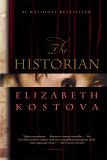Summary | Excerpt | Reading Guide | Reviews | Beyond the Book | Readalikes | Genres & Themes | Author Bio

Critics' Opinion:
Readers' Opinion:
First Published:
Jun 2005, 656 pages
Paperback:
Oct 2006, 688 pages
 Book Reviewed by:
Book Reviewed by:
BookBrowse Review Team
Buy This Book
Because this city is where my story starts, I’ll call it Emona,
its Roman name, to shield it a little from the sort of tourist who
follows doom around with a guidebook. Emona was built on Bronze Age
pilings along a river now lined with art-nouveau architecture. During
the next day or two, we would walk past the mayor’s mansion, past
seventeenth-century town houses trimmed with silver fleurs-de-lis, past
the solid golden back of a great market building, its steps leading down
to the surface of the water from heavily barred old doors. For
centuries, river cargo had been hoisted up at that place to feed the
town. And where primitive huts had once proliferated on the shore,
sycamores—the European plane tree—now grew to an immense girth above the
river walls and dropped curls of bark into the current.
Near the market, the city’s main square spread out under the heavy
sky. Emona, like her sisters to the south, showed flourishes of a
chameleon past: Viennese Deco along the skyline, great red churches from
the Renaissance of its Slavic-speaking Catholics, hunched brown medieval
chapels with the British Isles in their features. (Saint Patrick sent
missionaries to this region, bringing the new creed full circle, back to
its Mediterranean origins, so that the city claims one of the oldest
Christian histories in Europe.) Here and there an Ottoman element flared
in doorways or in a pointed window frame. Next to the market grounds,
one little Austrian church sounded its bells for the evening mass. Men
and women in blue cotton work coats were moving toward home at the end
of the socialist workday, holding umbrellas over their packages. As my
father and I drove into the heart of Emona, we crossed the river on a
fine old bridge, guarded at each end by green-skinned bronze dragons.
"There’s the castle," my father said, slowing at the edge of the
square and pointing up through a wash of rain. "I know you’ll want to
see that."
I did want to. I stretched and craned until I caught sight of the
castle through sodden tree branches—moth-eaten brown towers on a steep
hill at the town’s center.
"Fourteenth century," my father mused. "Or thirteenth? I’m not
good with these medieval ruins, not down to the exact century. But we’ll
look in the guidebook."
"Can we walk up there and explore it?"
"We can find out about it after my meetings tomorrow. Those
towers don’t look as if they’d hold a bird up safely, but you never
know."
He pulled the car into a parking space near the town hall and helped
me out of the passenger side, gallantly, his hand bony in its leather
glove. "It’s a little early to check in at the hotel. Would you like
some hot tea? Or we could get a snack at that gastronomia. It’s
raining harder," he added doubtfully, looking at my wool jacket and
skirt. I quickly got out the hooded waterproof cape he’d brought me from
England the year before. The train trip from Vienna had taken nearly a
day and I was hungry again, in spite of our lunch in the dining car.
But it was not the gastronomia, with its red and blue interior
lights gleaming through one dingy window, its waitresses in their navy
platform sandals—doubtless—and its sullen picture of Comrade Tito, that
snared us. As we picked our way through the wet crowd, my father
suddenly darted forward. "Here!" I followed at a run, my hood flapping,
almost blinding me. He had found the entrance to an art-nouveau
teahouse, a great scrolled window with storks wading across it, bronze
doors in the form of a hundred water-lily stems. The doors closed
heavily behind us and the rain faded to a mist, mere steam on the
windows, seen through those silver birds as a blur of water. "Amazing
this survived the last thirty years." My father was peeling off his
London Fog. "Socialism’s not always so kind to its treasures."
Copyright © 2005 by Elizabeth Kostova. All rights reserved. No part of this book maybe reproduced without written permission from the publisher Little, Brown & Co.





The Flower Sisters
by Michelle Collins Anderson
From the new Fannie Flagg of the Ozarks, a richly-woven story of family, forgiveness, and reinvention.

The House on Biscayne Bay
by Chanel Cleeton
As death stalks a gothic mansion in Miami, the lives of two women intertwine as the past and present collide.

The Funeral Cryer by Wenyan Lu
Debut novelist Wenyan Lu brings us this witty yet profound story about one woman's midlife reawakening in contemporary rural China.
Your guide toexceptional books
BookBrowse seeks out and recommends the best in contemporary fiction and nonfiction—books that not only engage and entertain but also deepen our understanding of ourselves and the world around us.